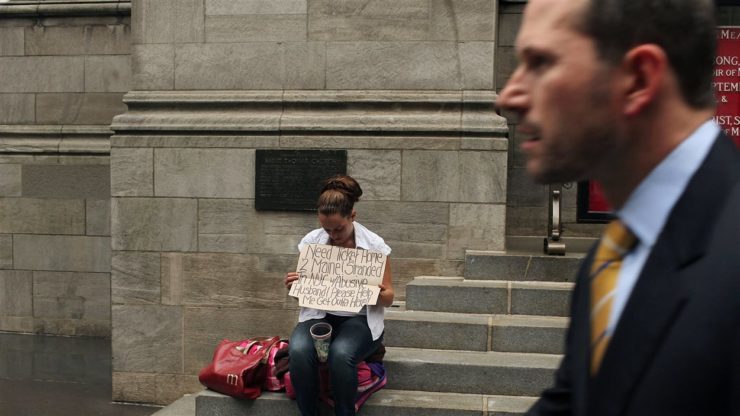
The income gap between the rich and the poor remains the biggest global problem facing human society as a whole. After the collapse of the USSR (whose social achievements served as a powerful incentive for the poor to fight for their rights in the developed world), there were no moral constraints and the rich went on a rampage: the number of not only millionaires but also billionaires increased dramatically. The gap between the richest and the poorest grew ever wider.
Naturally, the vast majority of the population, especially in developed countries, tried to somehow reduce the monstrous wealth of a small group of billionaires and redistribute it for the benefit of society. Dissatisfaction with the status quo has been evident during the current election campaign in the United States – the economic situation is the biggest factor in voter sentiment.
A few days ago, polls showed Trump well ahead of Biden, but in the last few days of March, the popularity of the current president has increased and in a number of states he is almost tied with Trump: in fact, in the draft budget for the current fiscal year, the US administration has proposed a 25 per cent tax on all assets over $100 million. This tax applies to only 0.01 per cent of Americans.
The draft budget suggests that these new tax rates would raise an additional $1.17 trillion.
Several American billionaires have strongly opposed the idea.
A 2018 Gallup poll found that more than 60 percent of Americans believe that wealthy individuals and corporations pay little in taxes.
It is unknown whether Congress will be able to agree to the current administration’s proposal. Bogateev decided to support The Economist, which published reviews of two books by Ingrid Robeyns of the Netherlands and Luke Hildyard of Britain.
According to the Dutch researcher, the state should prevent anyone from accumulating more than $10 million (or pounds or euros – that’s a rough figure). In addition to this hard-political limit, she believes there should be a much lower “ethical” limit. In countries where the state pays for health care and pensions, no one should accumulate more than $1 million in savings, and society should despise anyone who does.
In Hildyard’s view, no one should earn more than the current threshold for entry into the top 1% of taxpayers (in the UK this figure was over £180,000 per year in 2021-2022; in America it was almost $330,000 in 2021.) There is no real downside to redistributing additional income or wealth beyond this amount, or to policies that ensure that wealth does not accumulate at all.
Both authors believe that the rich are damaging the environment with their private jets and occasional holidays in space. They exacerbate housing shortages by owning multiple homes, they buy political influence, and some have acquired their wealth through dishonest means. Both authors blame rising inequality for a host of ills, arguing that a more equal society would be less stressed and more cohesive. The money accumulated by the rich could be used to support the poor and improve public services.
“The Economist” finds these ideas counterproductive: clever advisers would help rich people hide their assets or move them to friendlier jurisdictions; if governments managed to thwart such tricks, many rich people would emigrate. “And if all governments adopted the same policy of banning assets and enforcement was tough, as the authors want, the consequences would be even worse”.
According to the magazine, highly productive people such as surgeons or engineers, not to mention wordsmiths like J.K. Rowling, will have no financial incentive to continue working. Some may continue to work out of altruism or love of their work, but many will be tempted to sit back, relax and deprive the world of their extraordinary skills, drive and imagination. This will hit entrepreneurs, and in this case most businesses that require huge up-front capital – from chip factories to offshore wind farms – should probably be owned or supported by the state. Given that, according to the Journal, the history of state-owned industries over the last century has been one of cronyism, slowness and inefficiency, this should have given the authors pause for thought. Perhaps there is still a reasonable case for further redistribution, at least in some places. But in a 2017 study of 27 rich countries, Jacob Lundberg of Uppsala University in Sweden found that five countries (Austria, Belgium, Finland, Sweden and Denmark) had tax rates so high that their governments could raise more money by cutting them. Hence the conclusion: the idea that governments can get much more money from high tax rates is “delusional”.
Wealth inequality in the Western world has risen dramatically in recent decades, and there is growing support for a progressive tax system. In an analysis for 2021, the ProPublica Centre calculated that between 2014 and 2018, the 25 richest Americans – a list that includes Elon Musk, Warren Buffett and Jeff Bezos – paid a real tax rate of 3.4% of their income. The super-rich can get away with this because much of their wealth comes from asset ownership rather than wage income, and they use many tax loopholes and accounting tricks to get a lower rate. Musk, for example, paid zero federal income tax in 2018.
Some states get a higher share of revenue from low-income Americans than from wealthy people.
In today’s world with new means of communication and information, the huge incomes of a few rich people will cause more and more outrage and protests, and eventually force governments to try to limit the staggering fortunes of a few billionaires.
Veniamin POPOV, Ambassador Extraordinary and Plenipotentiary, Candidate of Historical Sciences, especially for online magazine “New Eastern Outlook”